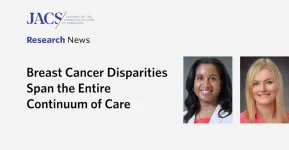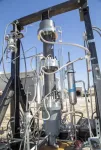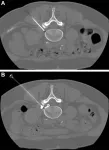(Press-News.org) Key takeaways
Inequitable access to breast cancer care: Treatment options for breast cancer are increasing, but many groups still do not have equitable access to preventative services, such as screening mammograms, and new therapies or drugs.
Wide spectrum of disparities: Screening, genetic testing, reconstruction, and fertility preservation are four significant areas where disparities exist and where surgeons should maintain awareness.
Surgeons can drive change: Surgeons can raise the standard of care at their institutions by improving their understanding of these disparities and advocating for their patients.
CHICAGO: Surgeons can play a key role in reducing breast cancer disparities by increasing their awareness of where disparities exist and having open conversations with their patients about their needs to initiate referrals early on in their care, according to a new collective review article published in the Journal of the American College of Surgeons (JACS).
Despite improved screening and treatment options for breast cancer — the most common cancer diagnosed in women excluding skin cancers — many populations face significant barriers to screening and treatment options for breast cancer.
Following a well-received in-person panel discussion on breast cancer disparities held at the American College of Surgeons (ACS) Clinical Congress in October 2022, an interdisciplinary team of clinicians, which included surgeons, a radiologist, and public health researchers, convened to explore these disparities in more detail for a research article in JACS.
“Many breast surgeons may already be aware of some of the disparities that exist in regard to breast cancer care, but we wanted to illustrate the wide scope of the problems and raise awareness among general surgeons and other healthcare provides who treat breast cancer patients,” said Kathie-Ann Joseph, MD, MPH, FACS, senior author of the study and a professor of surgery and population health at New York University (NYU) Langone Health. “Whether you work in a rural or city hospital, these are real issues that we deal with and face every day.”
Areas of Disparity
While disparities are multifactorial, the researchers identified four specific areas where disparities remain concerning: screening, genetic testing, reconstruction, and access to fertility-preservation treatments for cancer patients (also known as oncofertility).
“These are topics that are often overlooked. We sort of assume that most women who are diagnosed with breast cancer may require these services and that they are readily available. But unfortunately, depending on geography or the type of hospital that a patient is being treated, many of these services may not be available,” explained Dr. Joseph, who also serves as vice-chair for diversity and health equity at NYU Langone Health. “Or if they are available, certain patients may not have the full breadth of access for some of these services or treatments.”
Variable access to screening: Many women may not have access to or be able to afford some of the latest screening technologies — including 3D mammography, breast ultrasound, and breast magnetic resonance imaging (MRI) — even with health insurance. These technologies are increasingly used to screen for breast cancer and monitor women at high risk of the disease and/or who have increased breast density. The pandemic has further exacerbated these challenges by delaying screening for some women.
“There are differences in what screening services are offered, so I think we need to be asking: How do we make sure that people have equal access to the latest technologies so that they can anticipate the same great outcomes that other women can have?,” said Angelena Crown, MD, FACS, first author of the study and a breast surgeon at Swedish Cancer Institute in Seattle, Washington. “If we can find more cancers at an earlier stage, then we can really start seeing improvements, not only in survival but also in the quality of life associated with the treatments that are required for more advanced breast cancers.”
Genetic counseling and testing: Cancer care that integrates knowledge of genetics remains critical for the health of patients with cancer and their families. However, most genes associated with an increased breast cancer risk were first identified in Northern European Whites. As a result, women from different racial and ethnic groups who undergo genetic testing are more likely to receive inconclusive results, also known as variants of uncertain significance (VUS).
“I think there is a need for patient and clinician education about the importance of genetic testing for breast cancer prevention, screening, and targeted therapies,” said Allison Kurian, MD, MSc, a study co-author and professor of medicine and population health at Stanford Medicine. “It is also important for surgeons to recognize the unequal burden of VUS results. Surgeons should be ready to explain the implications of VUS results to patients and refer them to additional genetic counseling when appropriate.”
Access to fertility preservation: A growing number of women of childbearing age (< age 45) are diagnosed with breast cancer, accounting for about 11% of the population of breast cancer patients.* For these women, fertility preservation is vital for family planning purposes but can be cost-prohibitive for a large majority of patients.
“It’s really important for providers to think about the quality of life that these women are going to have. Most of these women are going to be diagnosed with curable disease, meaning anything less than stage 4, and they are expected to have long, healthy lives,” Dr. Crown said.
Reconstruction surgery: Patients who undergo a mastectomy have several options for reconstruction, including implant reconstruction or tissue (flap) reconstruction, where a woman’s own tissue from other parts of her body is used to reconstruct the breast. However, even with laws requiring some states to cover reconstruction, insurance and geography may still dictate what kind of reconstruction a patient is likely to receive.
“Oftentimes, having a tissue-based reconstruction is ideal for many patients but that may not be feasible, depending on the type of training the plastic surgeon has, and the availability of the procedure at a specific hospital,” Dr. Joseph explained. Language and health literacy barriers can further impact the information available to a patient.
Strategies to Improve Care
Recognizing the magnitude of these disparities, the researchers outlined key steps that breast cancer centers and surgeons can take to improve equitable care:
Advocate for patient navigation programs, which can improve rates of screening and increase patient satisfaction.
Open treatment centers in underserved communities, and when possible, implement flexible hours and help patients with access to travel and childcare assistance.
Assist with community-led health efforts and produce educational materials in a variety of formats and languages.
Improve the representation of minority groups in clinical trial research and improve diversity within the oncology workforce through dedicated programming and mentorship opportunities.
Increase funding of safety-net hospitals, which often treat a large proportion of low-income, uninsured, and other vulnerable populations, and increase research dedicated to addressing health disparities.
Refer patients, independent of their insurance status, to resources, such as grants or charitable programs, that can assist with coverage for genetic screening and fertility preservation, when possible.
Integrate genetic testing into oncology care by employing a genetic counselor in oncology clinics and/or offering online counseling and testing protocol, which may extend access to patients in rural areas or to those who have limited access to transportation and/or time off from work.
Unique Role of Surgeons
Surgeons are often the first point of contact in a patient’s journey through breast cancer. Surgeons can be important drivers of change, the authors noted, by maintaining their awareness of existing disparities and providing additional resources to patients when possible.
“One way to make a difference today is to be aware that access to breast cancer services is sub-optimal in many places, and that if you help your individual patients get access to necessary screening or treatment, you are already doing something good,” Dr. Crown said. “By initiating conversations early, surgeons can actually expedite patient care and give patients access to more options. We can really shape what that future life looks like for patients starting right there on day one in the office.”
“Finding small ways to help address disparities, even if it’s just referring a patient for one program that they would not have known about before, can make a huge difference for all our patients who are diagnosed with breast cancer,” Dr. Joseph added. “It just starts with that one small step. There is hope, but it requires work.”
Study coauthors are Soudabeh Fazeli, MD, MPH and Daniela A. Ochoa, MD, FACS.
The study authors have no relevant disclosures to report.
This article is published as an article in press on the JACS website.
Citation: Crown A, Fazeli S, Kurian A, et al. Disparities in Breast Cancer Care: Current State of Access to Screening, Genetic Testing, Oncofertility, and Reconstruction. Journal of American College of Surgeons. DOI: 10.1097/XCS.0000000000000647.
-----
* Trivers KF, Fink AK, Partridge AH, et al. “Estimates of young breast cancer survivors at risk for infertility in the US.” The oncologist 19, no. 8 (2014): 814-822.# # #
About the American College of Surgeons
The American College of Surgeons is a scientific and educational organization of surgeons that was founded in 1913 to raise the standards of surgical practice and improve the quality of care for all surgical patients. The College is dedicated to the ethical and competent practice of surgery. Its achievements have significantly influenced the course of scientific surgery in America and have established it as an important advocate for all surgical patients. The College has more than 84,000 members and is the largest organization of surgeons in the world. “FACS” designates a surgeon is a Fellow of the American College of Surgeons.
The Journal of the American College of Surgeons (JACS) is the official scientific journal of ACS. Each month, JACS publishes peer-reviewed original contributions on all aspects of surgery, with the goal of providing its readership the highest quality rapid retrieval of information relevant to surgeons.
END
Significant disparities in breast cancer care persist, but surgeons can drive change
Research outlines actionable steps to address longstanding health disparities in breast cancer screening and treatment options
2023-03-28
ELSE PRESS RELEASES FROM THIS DATE:
SwRI creates innovative, efficient hydrogen compressor for FCEV refueling stations
2023-03-28
SAN ANTONIO — March 28, 2023 - A new hydrogen compressor developed at Southwest Research Institute (SwRI) can improve the efficiency and reliability of hydrogen compression used in the refueling of fuel cell electric vehicles (FCEVs). The SwRI-developed linear motor-driven reciprocating compressor (LMRC) is designed to compress hydrogen as a fuel source for FCEVs and other hydrogen-powered vehicles. Unlike most hydrogen compressors, SwRI’s LMRC is hermetically sealed and has a linear motor design that increases its ...
Europe PMC integrates ROR into its Grant Finder
2023-03-28
Europe PMC, one of the largest providers of high-performance search tools for life sciences literature, has announced that its Grant Finder now incorporates Research Organization Registry (ROR) IDs to help users find active and completed grants awarded by Europe PMC funders. As one of the operating organizations of ROR, Crossref is pleased to jointly announce this news.
Integrating ROR IDs into the Europe PMC Grant Finder means that organizational name variations are now aggregated under a single name, which allows people to search for different aliases and receive the same set of results. Europe PMC used the ROR API in conjunction with a manual screening step to match 82% of ...
Pulsed radiofrequency with steroid injection brings sciatica relief
2023-03-28
OAK BROOK, Ill. – Researchers found that a minimally invasive procedure combined with epidural steroid injection treatment led to superior pain reduction and disability improvement over one year in patients with sciatica. The results of the study were published in Radiology, a journal of the Radiological Society of North America (RSNA). The combined treatment performed better than steroid injections alone.
Sciatica is pain that originates along the sciatic nerve, which extends from the back of the pelvis down the back of the thigh. The sciatic nerve is the largest nerve in the body. Treatments ...
Probe where the protons go to develop better fuel cells
2023-03-28
Fukuoka, Japan—Solid oxide fuel cells, or SOFC, are a type of electrochemical device that generates electricity using hydrogen as fuel, with the only 'waste' product being water. Naturally, as we strive to reduce our carbon output and mitigate the casualties of the climate crisis, both business and academia have taken major interest in the development of SOFCs.
In what can potentially accelerate the development of more efficient SOFCs, a research team led by Kyushu University has uncovered the chemical innerworkings of a perovskite-based ...
Could changes in Fed’s interest rates affect pollution and the environment?
2023-03-28
Can monetary policy such as the United States Federal Reserve raising interest rates affect the environment? According to a new study by Florida Atlantic University’s College of Business, it can.
Using a stylized dynamic aggregate demand-aggregate supply (AD-AS) model, researchers explored the consequences of traditional monetary tools – namely changes in the short-term interest rate – to the environment. Specifically, they looked at how monetary policy impacts CO2 emissions in the short and long run. The AD-AS model conveys several interlocking relationships between the four macroeconomic goals of growth, unemployment, inflation and a sustainable balance ...
For advanced endometrial cancer, chemotherapy plus immunotherapy improves outcomes
2023-03-28
Endometrial cancer, which makes up about 90% of uterine cancers, will be diagnosed in more than 65,000 people in the United States this year. It is the fourth most common cancer in women and is one of the few cancers that is increasing in incidence and mortality. Unfortunately, very few treatments have been developed specifically for endometrial cancer.
Now, new research published March 27, 2023, in The New England Journal of Medicine finds adding the immunotherapy drug pembrolizumab (Keytruda®) to standard chemotherapy greatly improves patient outcomes in both patients whose tumors have a genetic alteration leading ...
ASBMB calls for 10% budget increase for NIGMS
2023-03-28
The American Society for Biochemistry and Molecular Biology submitted testimony to the U.S. House Appropriations Committee March 22 outlining its recommended budgets for major scientific funding agencies. Notably, the society requested a significant 10% increase in the budget for the National Institute of General Medical Sciences, which is part of the National Institutes of Health.
“The ASBMB has a longstanding history of advocating for NIGMS and its researchers, and the majority of our members are funded by and rely on NIGMS to advance their research,” Sarina Neote, public affairs director of the ASBMB, said. “The ...
NIH researchers discover new autoinflammatory disease, suggest target for potential treatments
2023-03-28
WHAT:
Scientists have identified an autoinflammatory disease caused by mutations in the LYN gene, an important regulator of immune responses in health and disease. Named Lyn kinase-associated vasculopathy and liver fibrosis (LAVLI), the identification sheds light on how genes linked to certain illnesses can potentially be targets for treatment by repurposing existing drugs. The research, published in Nature Communications, was led by Adriana A. de Jesus, M.D. Ph.D., and Raphaela Goldbach-Mansky, M.D., M.H.S. of the Translational ...
KICT develops a ground & structure collapse detection sensor
2023-03-28
The Korea Institute of Civil Engineering and Building Technology (KICT, President Kim Byung-suk) developed a smart sensor that detects signs of ground or structure collapses and a real-time remote monitoring system.
The development of the sensor and system began with a search for a method of instant sensing of the collapse of slopes or buildings caused by ground movement for immediate response. This led to the development of a smart sensor that turns on a LED warning light upon detecting ground movement. The ...
Study: “Safer” PFAS in food packaging still hazardous
2023-03-28
Replacement per- and polyfluoroalkyl substances (PFAS) heralded as safe for use in food packaging break down into toxic PFAS that leak into our food and environment, suggests a study published today in Environmental Science & Technology Letters.
Due to the known exposure risks of using smaller PFAS molecules like PFOA and PFOS in food-contact materials, many companies have pivoted to using larger polymeric PFAS to make their wrappers, bowls, and other fast-food packaging water- and grease-repellant. ...
LAST 30 PRESS RELEASES:
Wildfire smoke linked to rise in violent assaults, new 11-year study finds
New technology could use sunlight to break down ‘forever chemicals’
Green hydrogen without forever chemicals and iridium
Billion-DKK grant for research in green transformation of the built environment
For solar power to truly provide affordable energy access, we need to deploy it better
Middle-aged men are most vulnerable to faster aging due to ‘forever chemicals’
Starving cancer: Nutrient deprivation effects on synovial sarcoma
Speaking from the heart: Study identifies key concerns of parenting with an early-onset cardiovascular condition
From the Late Bronze Age to today - Old Irish Goat carries 3,000 years of Irish history
Emerging class of antibiotics to tackle global tuberculosis crisis
Researchers create distortion-resistant energy materials to improve lithium-ion batteries
Scientists create the most detailed molecular map to date of the developing Down syndrome brain
Nutrient uptake gets to the root of roots
Aspirin not a quick fix for preventing bowel cancer
HPV vaccination provides “sustained protection” against cervical cancer
Many post-authorization studies fail to comply with public disclosure rules
GLP-1 drugs combined with healthy lifestyle habits linked with reduced cardiovascular risk among diabetes patients
Solved: New analysis of Apollo Moon samples finally settles debate about lunar magnetic field
University of Birmingham to host national computing center
Play nicely: Children who are not friends connect better through play when given a goal
Surviving the extreme temperatures of the climate crisis calls for a revolution in home and building design
The wild can be ‘death trap’ for rescued animals
New research: Nighttime road traffic noise stresses the heart and blood vessels
Meningococcal B vaccination does not reduce gonorrhoea, trial results show
AAO-HNSF awarded grant to advance age-friendly care in otolaryngology through national initiative
Eight years running: Newsweek names Mayo Clinic ‘World’s Best Hospital’
Coffee waste turned into clean air solution: researchers develop sustainable catalyst to remove toxic hydrogen sulfide
Scientists uncover how engineered biochar and microbes work together to boost plant-based cleanup of cadmium-polluted soils
Engineered biochar could unlock more effective and scalable solutions for soil and water pollution
Differing immune responses in infants may explain increased severity of RSV over SARS-CoV-2
[Press-News.org] Significant disparities in breast cancer care persist, but surgeons can drive changeResearch outlines actionable steps to address longstanding health disparities in breast cancer screening and treatment options







